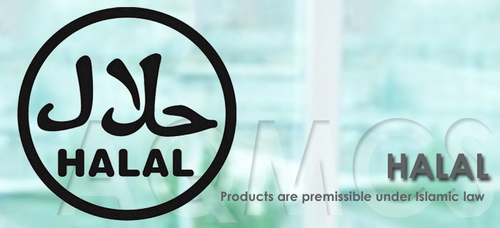
Halal Certification
Halal is a Quarnic term that simply means ‘permitted’ or lawful’ Halal when used in relation to food and other consumables means permissible for consumption and used by Muslims based on the Islamic law, which is the Sharjah
When it comes to Halal food, most people think of meat products only. However, Muslims must ensure that all foods, particularly processed foods, pharmaceuticals and non food items like cosmetics are also Halal. Often these products contain animal by-products or other ingredients that are not permissible for Muslim consumption.
HALAL CERTIFICATION
Most food producers, especially those from non-Muslim countries, assumed that vegetable-based products are safe for Muslim consumption. Thus Halal certificationis not required by established Islamic Council. But the Halal Certification System is not only with regards to the raw material used. It encompasses the whole production process which includes processing, packaging, labelling, storage and transportation.
The production premises and facilities used must only be for the purposes of Halal foods production. The same premise and facilities are not to be used for both Halal and non-Halal food production. This is notwithstanding that those premises and facilities have been cleaned thoroughly as in accordance to the Syariah Law. This stringent measure is taken to prevent Halal foods from being contaminated with Haram elements or any other elements that are considered filthy (Najis) by the Syariah Law.
Halal certification is not only limited to food produce. Other products such as non-alcohol beverage, raw materials needed in food processing, pharmaceutical andhealth care products, traditional herbal products, cosmetics and personal care products, cleaning products, daily consumable products and leather-made products (e.g. shoes, furniture and hand-bag) are examples of things that have to be Halal for Muslim consumption/usage.
Generally all plants are Halal as long as it is not poisonous and not intended to be made into Haram food. However, a processed vegetable-based food is not naturally Halal if any of the production cycle is tainted with unclean elements (filthy or Najis) as in accordance with the Shariah Law. For instance, fats and oils or shortening is used during the process to enhance the taste of vegetable based food. Some of these enhancers may have been derived from a non-Halal animal. In addition some vegetable fats is processed in the same machinery which has been used to process non-Halal animal fats. Further, some packaging may contain animal grease such as pork fats. If these packaging materials have been in contact with the Halal vegetable-based products in anyway, it will render those products Haram and unfit for Muslim consumption.
In addition to that, places like restaurants,hotels, slaughtering houses; packaging and labeling materials are also required to have Halal certification to ensure they are suitable to be visited / used by Muslim consumers.
Benefits of HALAL certification
HALAL logo is an authoritative, independent and reliable testimony to support halal food claims.
Opportunities to tap global HALAL food market of about 2 billion people(Asia pacific, middle East, EU, USA, Central Asia).
- 200% profit of greater market share, no loss of non- Muslim markets/clients.
- Enhance marketability of products in Muslim countries/markets.
- Small cost investment relative to multiple growth in revenues.
- Image boosts in meeting varied customers need.
- Improve the food quality into global standards.
Organic Certification
What is Organic Certification
Organic Certification is the procedure for verifying that the products conform to certain standards. In case of Organic Products, it is primarily the acknowledgment that the products have been produced according to the applicable Organic Standards. Basically all the major organic markets of the world like India, European Union, USA, and Japan have developed their own Organic Standards.
- Lab test report for all the items we sale for % of organic content is to be made available.
- A food labeled 100% Organic means that 100% of the substances, ingredients, processing aids, food additives are certified organic. Most often these foods are fresh certified organic fruits and vegetables, or products with very few ingredients (all of which are certified organic.)
- Organic means that 95-100% of the ingredients are organic. All Horizon Organic products are labeled this way.
- Only food items with either of the above terms can use the ORGANIC seal. Food labeled Made with Organic Ingredients contain 70-94% organic ingredients, and cannot use the ORGANIC seal
Benefit of Organic Certification?
- Organic certification helps in building trust between consumers and Organic farmers.
- The certification mark ‘Organic’ is the only means to differentiate between certified Organic and conventional foods.
- Labels and certification marks help a consumer to recognize trust worthy Organic products easily.
- Organic certification and the logo are important marketing tools.
- Organic certification helps in getting comparatively a better price.
How to get Organic Certification
Farming
- Improving the quality of the soil is the basis for organic.
- The farm’s soil must be free of prohibited substances for a minimum of three years prior to harvesting crops that will be labelled as organic.
- The National Organic Program (NOP) encourages farmers to improve soil fertility and rotate crops to naturally increase crop yields and disease resistance.
Harvesting
- Organic crops are picked, cut, and cleaned in the field.
- To ensure organic integrity, certifying these operations is necessary.
- Equipment used for harvesting and processing must be cleaned and sanitized in accordance with NOP requirements.
Packaging
- Packaging may occur in the field, at a facility or where a product is cleaned, canned or bagged, and given a product label, name or an identification number such as a UPC code.
- Organic products are verified to make sure organic integrity has been maintained through the packaging process.
Processing
- Organic crops can be processed further with other organic crops or spices.
- To ensure the organic integrity of a product has been maintained, a USDA-accredited certifying agent, such as CERTIFICATION BODY, must inspect these operations to ensure that they are operating according to the NOP and certify their compliance.
Labeling
- Labeling is a very important and complex part of the NOP.
- How agricultural products have been handled, processed, and combined with other ingredients determines how it can be labeled organic.
- 100% Organic = 100% organic ingredients and processing aids
- Organic = At least 95% organically produced ingredients, with the remaining % from the National List of allowed ingredients
- Made with Organic Ingredients = Minimum of 70% organic content with the remaining % of allowed ingredients
Shipping
- Products are shipped to distributors or to retail stores.
- To ensure the continued organic integrity, products must be protected from contamination by non-organic products.
- Prior to loading and unloading, trucks are verified for shipping practices that maintain this integrity, such as the prevention of commingling of organic and nonorganic products and impermeable packaging.
Distribution
- Products are compiled from farms, processors, or other distributors to one central location in order to distribute products.
- If organic product is repackaged, perhaps to smaller sizes, CERTIFICATION BODY would confirm that organic integrity has been maintained.
Transportation
- Similar to shipping, special accommodations must be in place to protect organic products from contamination. Retail
- Consumers can look for the USDA’s organic seal and a certifier’s mark, such as CERTIFICATION BODY’s mark, to ensure that each step in the entire organic supply chain meets the NOP guidelines.
What we offer in the field of organic standard and certification
As one of the largest management system certification consulting companies across the world with clients in more than 40 countries, our knowledge and experience of the standards is unsurpassed. We understand how to fully exploit the benefits of your organic certification to ensure you unlock the true potential in your organization.
We provide unmatched expertise and technical competence to ensure that your organic certification project adds value to your organization.
We provide consulting, training, internal audits, pre assessment audits and facilitation during organic certification audit.
We offer our global knowledge moulded locally to bring in the best results for our clients and partner their journey of standardization, compliance, growth, success and continual improvements.
Contact us now, to get your organization organic certified in the most effective and efficient manner while realizing the true benefits of the certification using our specialized organic certification implementation methodology that is less time consuming, fast, easy to understand and implement, result oriented, time bound and cost effective. Get organic certified now with us….



